Psychoakustika (1)
Diese Reihe, ganz gleich, ob sie umfänglich wird oder rasch versandet, beginnt möglichweise mit einem Fehler: ist das Wort „Psychoakustika“ korrekt so, nicht die Eigenwilligkeit interessiert mich, allein die Rechtschreibung. Es geht um unsere Erlebnisweisen von Musik. Der erste Teil widmet sich, in aller Kürze, dem Phänomen, dass man manche Musikalben mag, gut findet, ohne dass der letzte Funken überspringt – und dann tut er es doch, und wie! So ein Album ist für mich „Woodland Studios“ von Gillian Welch und David Rawlings (2024). Das die Musik richtig gut ist, spürte ich von Anfang an, aber erst jetzt hat sie mich so tief berührt, getroffen, dass mir bei drei Songs Tränen ihren Weg fanden. Und so höre ich gerade dieses Album wieder und wieder, lese die Texte, versinke in den Gesängen des Duos, ihrem Gitarrenspiel, den kleinen Ideen am Rande – und finde keinen einzigen „filler“, nichts, dass überflüssigerweise noch Teil des Ganzen geworden ist.

„Ein Güterwagen täuscht das Auge. Auf seinen sich drehenden Rädern ist keine Ladung zu sehen, nur die Knochen einer Fracht, die den Himmel einrahmen, durchschossen von Blau. So beginnt das neue Album von Gillian Welch und David Rawlings: mit einem illusorischen Fenster zum Jenseits. „Empty Trainload of Sky“ ist eine akustische Rock’n’Roll-Miniatur, wie sie Welch und Rawlings auf ihrem Meisterwerk Time (the Revelator) aus dem Jahr 2001 perfektioniert und seither bewusst mit zwei Gitarren, zwei Stimmen, Spannung, Anmut und Entschlossenheit erweitert haben. Der Schwung dieses skelettartigen Mystery-Trains trägt Tradition und Unendlichkeit in sich. Ob er nun hohl oder voll ist, nichts oder alles enthält, er rast immer weiter vorwärts.“ (Jen Pelly, NPR)
Es folgt: PA (2) – „Platten, die so grossartig sind, dass man sie nur einmal im Leben hören will // PA (3) – „ Warum Neil Youngs „Talking To The Trees“, das generell verrissen wird, in meinen Ohren ein verdammt gutes Album ist
Sweet nightmares are made of this (1982, remake)
Der Kollege drehte sich eine Zigarette, er sass mir gegenüber in unserem Zwei-Mann-Büro. Zwei Psychologen, einer hatte Liebeskummer. Michael, um aus dieser Nummer raus zu kommen, flieg nach London, über Weihnachten, das ist doch deine Stadt. Du musst einfach ständig wach sein, saug Piccadilly auf, das tut richtig weh, aber gut, alleine, ganz alleine, saug die Einsamkeit auf. In vollen Zügen. Das hilft. Down to the bottom! Ja, sie ist bestimmt die schönste Frauen Regensburgs. Du warst ihr Ausbruch, sie hat die Reissleine gezogen.
Die Würfel sind gefallen. Er hatte ja so recht. Ich wohnte noch immer am Ende der Welt, die Wölfe der Tschechei kamen manchmal über die Grenze, und ein Buch mit Kurzgeschichten von Richard Brautigan lag neben dem Bett. Ich fuhr von Bergeinöden nach Frankfurt und besorgte mir ein Flugticket nach London. So allein wollte ich auch nicht sein, und so kündigte ich meinem alten Würzburger Freund David Webster meinen Besuch an. Er freute sich darauf, mich wiederzusehen.
In Frankfurt verweigerten sie mir die Einreise nach London. Ich landete in Büros, und musste sogar zu einem amerikanischen Konsulat, wieso musste ich auf das fucking amerikanische Konsulat? Ein Riesentheater, und ich war sauer, und zeigte das auch. Da klärte es sich, dass ich als Amerikareisender gebucht war, ohne Visum, alles war ein Missverständnis im Frankfurter Nieselregen. Lauter Sorrys und Entschuldigungen, und Lufthansa schenkte mir ein Ticket für die Business Class, mit Sekt und allem Drum und Dran für eine Dreiviertelstunde Flug in den Londoner Nebelregen.
Heiligabend war ich bei den Websters eingeladen, bis dahin hatte ich zwei Tage: billige Absteigen, alte Cafes, und ich besorgte mir sofort ein Musikmagazin. Musik sollte Teil meiner Selbsttherapie sein. Ich liess mich in einem Pub nieder, erleichtert nach dem Tagesstress, der Kaktus auf der Ablage über mir geriet in Bewegung und plumpste dem Mann hinter mir in den Nacken. Ein Aufsschrei. Ich kümmerte mich sofort um ihn, zog ihm einzelne Stachel raus, ein paar Stellen waren blutig, aber er blieb freundlich. Der Pubbesitzer hatte sogar ein Desinfektionsmittel. Am Abend ging ich in den Marquee Club, um Jah Wobble & The Invaders of the Heart zu erleben.
Jah Wobble hatte einen Trenchcoat an, der aussah, als wäre er den ganzen Tag durch den Londoner Dunkelregen gewandert. Man konnte hören, dass Jah Wobble nach der Zeit mit Public Image Ltd. noch viel mehr in die Welt des „elektrischen Miles“ eingetaucht war. Dunkel pulste sein Bass durch den Raum. Eine Trompete mit Wah-Wah-Pedal verschickte knappe telegraphische Notizen, der Drummer hämmerte wohltuende Monotonie. Da erkannte ich sie und taufte sie Healy. Du bist die Fremde, mit der ich diese Nacht erobern werde. Sie stand alleine an der Seite, und trug auch einen fucking beautiful Trenchcoat. Hoffentlich war sie kein Jah Wobble-Groupie. War sie nicht.
Nach dem Konzert lud ich sie zu einem Drink ein, nachdem ich mich freundlich vorgestellt hatte. Why me, fragte sie mich, und ich sagte, your eyes. Sie hatte ein kleines Appartment in West Hampstead. Sie legte eine gemeinsame Lieblingsplatte auf, Chairs Missing von Wire, und dann schliefen wir miteinander. In dieser Nacht lösten sich die Bilder der schönsten Frau Regensburgs in den Umarmungen einer Wildfremden auf. Wir kifften, lachten, und mochten einander – small talk with a beating heart. Sie hatte kleine feste Brüste und einen extrem schlanken Körper, Londoner Regenblässe. Sexual Healing. Ein wenig.
Ich wanderte den ganzen Tag durch Hampstead Heath, ich hörte spät am Abend John Peel im billigen Hotelzimmer (er spielte Musik von Howard Devotos Band „Magazine“, ich weiss es noch genau, einen Song aus „Second Hand Daylight“, oder „The Correct Use of Soap“, wunderbar) und am nächsten Abend, Heiligabend, traf ich bei den Websters ein. Es gab Gans, Rotkohl, und Plumpudding. Es waren noch andere Gäste da. Ich hatte mir einen Infekt eingefangen, und später nachts 38.9 Grad Fieber. Ich schnupfte. David sagte: Michael, erzähl, wie war das Jahr? Wollt ihr das wirklich hören? Ja, Mann! Und ich erzählte die ganze Geschichte. Bis zu dem Augenblick, wo mein Kollege sich eine Zigarette drehte. In einer Fachklinik für Suchtabhängige. Ich ruinierte die Party mit dieser Story, leider. Obwohl ja alles so magisch anfing, mit einem Western mit James Stewart, und dem berühmten Song der Gruppe Grauzone. Ich hätte gerne als Entschuldigung einen Weihnachtsbaum gestiftet. Für Mrs. Webster wurde ich zum roten Tuch.
Das Allerschönste in diesen Tagen waren die Fahrten mit der Underground, besonders die Augenblicke, wenn man die letzte Treppe zum Tageslicht betrat. Immer wieder gerne: Piccadilly Circus, die bunten, flackernden Werbetafeln im Dauerregen. Ich kam mir vor wie in einer ungeschriebenen Geschichte von Richard Brautigan. Eine, in der Duftkerzen Patchouli verströmen, die Kinks im Radio „Mr. Pleasant“ spielen, ein Hirschbraten mit Preiselbeerrahm serviert wird, und ein paar Glückskekse am Tannenbaum hängen.
„Sowieso nur ein gefrorener Himmel“
imagine a summer campfire feel, all
along tracks of purity and wit, kind
of naked, too. now imagine these songs
being even more naked while
rocking in quite nonchalant ways.
as a last step, imagine a room with
a flower, a shadow of the disappeared,
and strum simple, strum, strum – the guitar. (m.e.)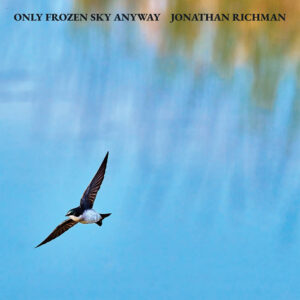
Manche halten ihn für einen Scharlatan, das ist auch schon Don Cherry passiert. Ich habe Jonathan Richman immer gemocht, aber erst seit einihej Jahren intensiver gehört – und sein neues Album spricht mir mit Charme, Witz und Wehmut aus der Seele. Ich habe das Album gestern auf dem staureichen Autobahnen zwischen Dortmund, Düsseldorf und Aachen herum auf bandcamp rauf und runter gehört. Die Lp und Cd-Versionen aus den USA sind schwer zu bekommen und teuer. Ein paar Zeilen aus Pitchfork: „Though he doesn’t dwell on the subject, death is the thread that ties together Only Frozen Sky Anyway. He admits as much in the record’s brief liner notes, writing of the deceptively lively “Se Va Pa’volver” that it represents a theme that took shape during the album’s recording sessions this past January: “The song is about how our friends are leaving, in their dying, on an errand, only to return. In another role. With another mission.” Nun, ich teile nicht „message“, aber die Fantasie!
(Neben „Modern Lovers 88“ habe ich nun also ein weiteres Lieblingsalbum von Jonathan gefunden – im folgenden zu lesen, ein paar ältere Texte aus dem alten Blog, zu „Modern Lovers 88“, von unserem einstigen Gefährten Bob T. Bright (2013), sowie Mark Smotroff (2018) – und von meiner Wenigkeit, das kleine hemdsärmelige Gedicht ganz oben.)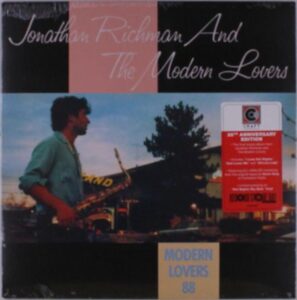
„In other words: Although I knew Jonathan Richman and the Modern Lovers through Roadrunner, Ice Cream Man and Egyptian Reggae, which I heard around the time of the first punk explosion, for some reason I never really listened to him very closely which is quite a long time to allow such a treasure to escape from your life … meanwhile I find myself more and more captivated by his enchanting music. What I find so great about him: Jonathan’s music is small and homespun in its sound and in its lyrical interest and yet manages to seem limitless in the possibilities it suggests of its possible meaning.“
„Whether he is writing about being a mosquito or about honey bees or parachute jumpers, about the joys of driving along a New England freeway or dancing in a lesbian bar; however small or parochial the nature of his concerns, the expansive nature of the joy that the lyrics give rise to in the listener and the vibrancy and ebullience of the music are such that any one of his songs could charge you with sufficient energy to still have room to counter the next wave of misery that is an inherent part of the human condition, but which he manages to somehow dissipate through his songwriting.“
„Although there are so many of his songs that are great, I particularly love ‚Twilight in Boston‚ because it expresses the joy of the mundane – of the prosaic, with precisely the deftness of touch that avoids slipping into the mawkish (of course, this is subjective). It happens to refer to Boston, but this could be an experience that anyone could have, anywhere in the world – at any time. It’s sung with that gleeful sense that enjoyment comes from the here and now, from the smallness of things, which at the same time are connected to something greater.“
Nachdem ich diese Texte zusammenstellte, merkte ich, welche Lust ich mal wieder verspürte, „Modern Lovers 88“ zu lauschen – ich stiess auf die Wiederveröffentlichung „zum Dreissigjährigen“ dank Marks Besprechung – aber sie hatte sich irgendwo in meinem Archiv versteckt. Nach zehn Minuten hatte ich sie ausfindig gemacht und laufen lassen, von der ersten bis zur letzten Rille. Wunderbar! Manchmal altert auch die Begeisterung für Dinge, warum auch immer, in diesem Falle erfüllte mich das Hören mit purer Freude. Die Sache mit Jonathan lässt sich nicht runterbrechen auf das ewige Kind im Manne, oder eine bewährte Regression im Dienste des Ichs. Sie geht um einiges tiefer, selbst da, wo ein Hetero in einer Lesbenbar singt.
“Luminal“ & „Lateral“
„Lieben oder hassen?! Ich liebe die Musik von David Sylvian. Einige seiner Songs sind für mich zeitlose Klassiker. Mit Melanie Dalibert ist es allerdings ganz anders, die Musik überlebt bei mir keine Minuten. Wenn ich lese, was David Sylvian über seine Zusammenarbeit mit Melanie schreibt, ist meine Reaktion: Wieso höre ich das nicht? Bin ich zu sehr mit dem Virus Jazz infiziert, um von dieser Musik noch erreicht zu werden? Übrigens geht es mir mit Brian Eno und seiner Musik der letzten Jahre genauso. Dafür muss ich wohl im Seniorenheim leben.“ (radiohoerer henry)

Flowworker: ***** („Luminal“) & **** („Lateral“)Warum ich noch nicht über das Büchlein „What Art Does“ von Brian Eno und Bette A. geschrieben habe, ist rasch erzählt: ich bin allzu vertraut mit all den Gedanken über Kunst, Feelings, Surrender, Play, etc. die Brian in dieser „unfinished theory“ ausbreitet, nach seinem Anspruch so verständlich, dass es auch nicht auf den Kopf gefallene Teenager verstehen können, und herrlich bunt bebildert ist es zudem! Wäre ich Kunstlehrer, wäre das Stammlektüre in meinen Klassen. Ab und zu schmökere ich mit Vergnügen in dem Bändchen.
Viel lieber aber begegne ich der Kunst ohne Metaebene, lasse die Feelings durch mich hindurch strömen und rauschen, wenn ich „Luminal“ oder „Lateral“ auflege, Brian Enos famose neuen Alben mit Beatie Wolfe, und erlebe da, ungefiltert, Surrender, Play, etc., in allen Schattierungen zwischen dem Unerhörten und dem Unheimlichen, zwischen dem Fest und den Erschütterungen des Lebens. Denn all das dringt hier durch, und viel zu fesselnd, in diesen Wochen, um kluge Worte darüber verlieren zu wollen.
Das Erlebnis der Tiefe spielt sich stets im Zwischenraum von Sender und Empfänger ab, und hier, bei den elf Songs von „Luminal“ etwa, bringe ich es schlicht und ergreifend so auf den Punkt, dass mein mutmassliches Songalbum des Jahres 2025 mich so tief erwischt, berührt, umfängt, umgarnt, verführt, auf gut deutsch „haunted“, dass es seinen Platz findet neben meinen Songalben der letzten beiden Jahre von Beth Gibbons und P.J. Harvey. „Luminal“ ist ein Album, das Tore öffnet, tief taucht und, mich jedenfalls, auf seltsam diskrete Weise, mitreißt!
P.S. I never got an interview in the years of „virtual conversations“ (the artist in an empty room (no „Zoom“, no „phoner“) that was technically so perfect (the icing on the cake). And her answers: interesting from start to end and „to the point“! You can listen to her solo talk from Brian Eno’s studio in Notting Hill until the end of September HERE!
„Openness Trio“ und „Chicago Waves“
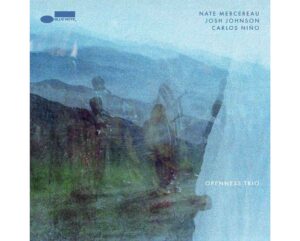
Ich blätterte durch Seiten, in denen ein Fan des Labels Blue Note in alten Zeiten schwelgte und fachkundig viele Klassiker in Kurzkritiken umkreiste. In späteren Jahren kamen da nicht mehr so viele Alben zusammen, eine neue Generation, neue Besitzer, die Helden starben, usw. Natürlich gab es immer wieder Werke, seit den Neunzigern, die etwas Besonderes waren, ob von Cassandra Wilson, Madlips „Shades of Blue“, und was uns da noch in den Sinn kommen mag.
Wenn ich fünf Alben des Labels hernehmen sollte, aus der Zeit zwischen 1990 und 2025, als „my blue note favorites of new times“, „Openness Trio“ wäre dabei, von Nate Mercereau, Josh Johnson, und Carlos Niño: von der Ästhetik bis zum Cover eigentlich zu einhundert Prozent der Welt von „International Anthem“ „entlehnt“. Das Album entstand, auch eher typisch für IAR, meist in freier Natur, einmal nahm man unter einem mexikanischen Pfefferbaum Platz.
Solche Naturklanginspirationen deuten, wie die ersten Saxofonsekunden des Albums, auf ECM und Jan Garbarek – und ansonsten: Freier Jazz, Psychedelik (immer ein Ausdruck bei verschwimmenden Sounds – mit Carlos Niño kann man gut über „magic mushrooms“ reden), Ambient Music (aber hinhören, bewusst, sollte man schon) – ich lasse die Floskeln ruhen, nur dies noch: das Album ist ziemlich unbeschreiblich! Und hat einen festen Platz in meinem Jahresrückblick!
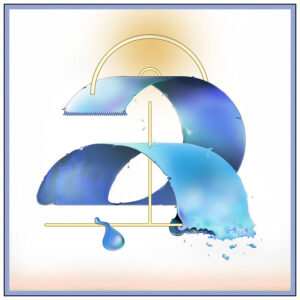
Wie, in den „archival recordings“ die Langspielplatte „Chicago Waves“, die Neuauflage eines Livemitschnitts des Duos Miguel Atwood-Ferguson / Carlos Niño aus dem Jahre 2018. International Anthem! Strukturell als völlig freie Improvisation angelegt („zwischen Ashram, Free Jazz und Ambient“, merkte ich in den JazzFacts mit einem Schmunzeln an), ist es in mancher Hinsicht ein enger Verwandter des „Openness Trio“, und Miguel gab als Inspirationen das Blau des Lake Michigan an, Jon Hassell, und einen Free Jazz Violinisten, der einst auf Impulse Records ein paar Platten veröffentlichte, Michael White.
„Zwei Karten für die Hafenstraße, Alter!“
Das war verblüffend, wie oft mir pure Irritation begegnete, wenn ich ausserhalb der Rituale von Klassentreffen ein paar ausgewählte Jungs, die damals Kumpel waren, anschrieb oder anrief, um mal ein Treffen auszumachen. Nicht ganz unverständlich, wenn, was Volksschulzeiten betrifft, nicht mal verstreute Begegnungen über die Jahre einen Anknüpfungspunkt ergaben. Und Mädels kamen gar nicht vor, da wäre Befremden durchaus verständlich.
Ich rede von Freunden, mit denen ich in unseren Dortmunder Vororten eine Reihe von kleinen und grossen Abenteuern erlebte, wenn nicht gleich auf dem Level von Enid Blytons „Fünf Freunden“, so doch unvergesslich genug – wenn, ja, wenn man nicht irgendwann die Kindheit zu einem „anderen Land“ erklärt, und Vorstösse dorthin im gesetzten Alter mit diversen Erstverdächtigungen begleitet werde, ob da einer verrückt geworden sei, oder depressiv, oder gar Geld wolle.
Da war, einmal, das schon in der Stimme spürbare Unverständnis der Gattin eines meiner Jugendkumpels zwischen 11 und 17, das nur noch getoppt wurde von der höflich-unterkühlten Sprache von Hans S., der ein kleines Treffen in Aussicht stellte, wenn er seine Mutter, die immer noch in dem Haus gegenüber wohnte, hochgradig senil, in zwei Wochen in eine Seniorenresidenz bringe. Ganz kurz sprach ich davon, wie ich die stolze Frau damals erlebt habe, und es entstand der Ansatz einer kurzen, doch recht förmlichen Unterhaltung.
Wenige Tage später eine förmliche Absage. Immerhin hatte ich rausgefunden, dass es die anderem drei Kumpel vom Wildbannweg noch gab. Als ich ihm auf wenigen Zeilen einige Erinnerungen und Gehemnisse auftischte, von einem gemeinsam durchgeführten telepathischen Experiment, bis zu diskret gehaltenen Liebeleien (die Namen blieben auch jetzt, aus Respekt vor den Lebenden und Toten ungenannt), war klar, in diesem und den kommenden Leben würde ich von H. nichts mehr hören. Ein komplettes Verschwinden von Interesse und Neugier.
Bleibt also mein 2024 wiedergefundener Schulkamerad Zurli, mit dem ich demnächst Haus um Haus in unserem alten Dornröschenweg abgehen, und seine Erinenrungen mit meinen anreichern werde und umgekehrt. Ursprünglich wollte ich im letzten Jahr vor allem meinen einstigen „Blutsbruder“ Matthias finden, kam dafür ein paar Monate zu spät. Jetzt bin ich guter Dinge, dass Zurli, Klaus (wieder bald gesund, hoffentlich!) und ich bald im alten Dorfkrug sitzen werden und der Zeit kurzfristig ein Schnippchen schlagen. In der Jukebox kann es dann gar nicht sentimental genug zugehen, von „Yesterday“ bis „Walk On The Wild Side“! Und, Zurli, es wird wieder Zeit für einen Sonntagsspaziergang! Mitte August, herrliches Sommerwetter, der BVB spielt bei Rot Weiss Essen, die erste Pokalrunde, und ich habe zwei Karten füre die Hafenstrasse, Alter! (Dank an Freddie R. – die Tickets waren ratzfatz ausverkauft!
Spieltage

Kinder der Bundesliga, das sind natürlich alle die, welche im ersten Jahr dabei waren, 1963, und von früh an Fan! Zu meinen schönsten Erinnerungen zählt „mein“ erster Gewinn eine Deutschen Meisterschaft direkt vor der Einführung der Bundesliga, als ich bei meinen Grosseltern live den 3:1-Sieg des BVB gegen den favorisierten 1. FC Köln verfolgte. Unvergesslich, wie auch Hoppy Kurrats Fernschuss zum 1:0. Es gibt kein schöneres und tieferes Buch zur Geschichte der Liga, als Ronald Rengs „Spieltage“. Eine Hauptrolle spielt darin Heinz Höher, einstiger Spieler und Trainer, Kauz und Original und auch noch verdammt schlau, aus dessen Perspektive vieles nacherzählt und neu aufbereitet wird. Leserausch für Freunde des runden Leders garantiert! Das Buch ist nun schon über zehn Jahre alt. Und ein „Klassiker“ geworden!

Wer sich nach dem Kommerzirrsinn der letzten Jahrzehnte einen Rest Fussballromantik bewahrt hat, kann Rengs Zeitreise mit soviel Vorfreude und Leselust und „memory triggering“ antreten, wie Jan Reetzes Trip durch die Krautrockära, „Der Sound der Jahre“! Wer sich auf dem Laufenden halten möchte, dem empfehle ich, sich die BuLi-Saison 2025/26 „Das Markensonderheft“ von „11 Freunde“ zuzulegen, diesem einzigartigen Magazin für Fussballkultur. Man erfährt darin nicht nur die Abschlusstabelle der kommenden Spielzeit, und einen detaillierten Bericht über das Pokalfinale im kommenden Juni, dass der BVB gegen Bayern 3:1 für sich entscheidet, sondern auch gewitzte Gespräche über Fussball mit Willy-Brandt Filius Matthias (Werder-Fan!), ein tolles Interview mit Bremens neuem Trainer Horst Steffen (ursypmpathisch), eine gnadenlose Abrechung mit dem Unfug der Klub-WM, ein aussagekräftiges Interview mit „unserem Kapitän“ Emre Can, und so viele Stories mehr.Heute Abend im Radio

„Benedicte is a unique musician with a vision. Her previous concert at Punkt was really beautiful. Her choice of musicians, especially that of Håkon Stene works beautifully alongside her playing the hardanger fiddle. The opening piece of Mirra has such a clear sense of place where you can almost feel the presence of the reindeer gathering at the Hardangervidda (Hardanger plateau). Perhaps a nod to Harold Budd’s „Plateaux of Mirror» ?“
Das schrieb mir Jan Bang gestern, zu Benedicte Maurseth, deren neues Album „Mirra“ heute Abend in den „Klanghorizonten“ des Deutschlandfunks um 21.05 Uhr ausgiebig vorgestellt wird. Die Stunde beginnt mit altem brasilianischen Flair, um dann weiterzuziehen ins Land der Rebriere, und in einen Ferienort an der englischen Ostküste, namens Yarmouth. Und sie endet (ein zweiter Abstecher zu „Mirra“) bei den Rentieren im riesigen Hardanger Hinterland und (radiotechnisch gesehen mit einer „Kreuzblende“) in einer versprengten Inselgruppe noch weiter nördlich, den Lofoten.
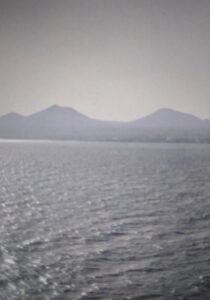
Richard Williams ist ja einer einer meiner Lieblingsjournalisten beim „Melody Maker“ in den Siebziger Jahren gewesen, und neugierig verfolge ich seinen Musikblog „The Blue Moment“, seine ruhigen, historisch fundierten Ausflüge durch die Musikhistorie. Der Mann lebte in London, als in den „wilden Jahren“ unendlich viel passierte. Einig sind wir uns bei den neuen Werken eines skandinavischen Quartetts um Arve Henriksen (ECM), und Amina Claudine Myers Solopianalbum (Red Hook). HIER Ingos Vorstellung dieser Red Hook-Produktion von Sun Chung.Scott McNiece: Introduction and „Chicago Waves“
im Zentrum der Stunde dreht sich alles um International Anthem Rec., das mittlerweile sein elftes Jahr erlebt, und die Klanghorizonte seit Jahren mit spannenden Alben versorgt. Das Interview mit einem der Gründer, Scottie McNiece kam einen halben Tag zu spät, um noch Teil der Klanghorizonte zu werden. Dafür gibt es Scotts O-Töne in diesem Text, in denen er über Jeremiah Chiu & Marta Sofia Honer spricht, über eine Wiederveröffentlichung aus der Frühzeit des Labels von Carlos Niño & Miguel Atwood-Ferguson, über Ben LaMar Gays Musik, und über die Rolle der Musik in dunklen Zeiten!
Scott McNiece on the role of music
Scott McNiece on „Different Rooms“
P.S. „So I sat down in my electric cave with a small pile of new experimental music, and that afternoon I fell in love with the new album by Jeremiah and Marta Sofia. At first I was sceptical about the spherical and synthetic (Klingklang is what I call sounds that just dance pretty on the surface), but it didn’t take long for the first tipping point of perception, and I heard these other spaces and interstices, and the strange sensations that came with them. Pretty indescribable, so the ‘review’ ends here. „Different Rooms“. Wondrous music. Safe Journey.“ (M.E.)
Die Kraft des sensiblen Tons (für Karsten Mützelfeldt)

Ich glaube, diese Sendung entstand im Jahr, als das Trioalbum „Rosslyn“ erschien, 2003. Die knappe Stunde hat, neben der Musik, ihre schönsten Passagen, wenn man John Taylors Erinnerungen, und dem Tonfall seiner Stimme, lauscht. Natürlich befragte ich ihn zu dem berühmten Album „Azimuth“ mit Kenny Wheeler und Norma Winstone, das unlängst in der ECM-Vinylreihe „Luminessence“ wiederveröffentlicht wurde. Und ich ging zurück in eine Zeit, in der er als Sideman spannende Ideen einbrachte in Volker Kriegels Werke „The Missing Link“ und „Lift!“ Alte MPS-Highlights!Ganz verwundert war ich beim Wiederhören dieser Sendung, dass ich seine Story zu den Aufnahmen einer meiner Lieblingsplatten von Jan Garbarek, „Places“, gar nicht vorfand. Ich überlegte einen Moment: ich habe jenen O-Ton sicher, zu einem Stück von „Places“, in einer Ausgabe der Klanghorizonte verwendet! Es ging da um eine kleine defekte Orgel, die John spielte, und die ihren Teil beitrug zu der Magie einer Aufnahme, an der auch Bill Connors und Jack DeJohnette mitwirkten.
Another dark and dancing world
„Manchmal macht man Entdeckungen, wenn man eigentlich viel zu müde ist dafür. Dann traut man seinen Ohren nicht, und dann doch!“
Speaking of perfect summer songs with deepness inside and surprises all along, HERE is one. Except it is not really a summer song. I am so stunned and haven’t heard any other song from the album. How often I am slightly disappointed when writers surpass one another with their writing on the next great singer. Oh, well, I say to myself, probably i‘m too old for this, but not here, not in this case.

I haven‘t read any review yet, but, in its own mysterious or very clear ways, this song takes me back to the early 80‘s and my time in the northern part of the Bavarian Wood, with „Too Rye Aye“ on high rotation in my little house in the middle of nowhere land. More than curious if the whole thing lives up to the time traveling standards of this song, and, more than that, its passages of euphoria and darkness.